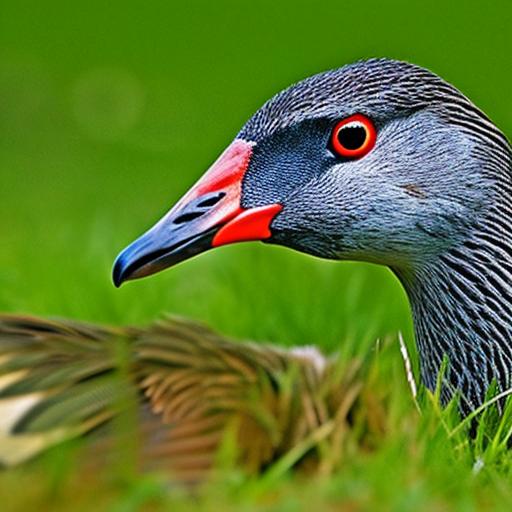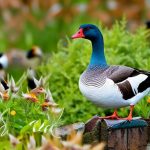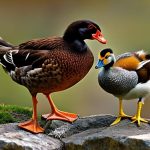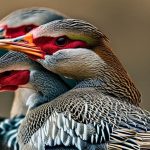Having geese on your lawn can be a nuisance and cause damage to your property. They are attracted to lawns because they provide a source of food, water, and shelter. Geese can leave behind droppings that are not only unsightly but can also pose health risks. Additionally, their constant grazing can damage the grass and plants on your lawn.
It is important to control geese on your property for several reasons. Firstly, their droppings can contain harmful bacteria such as E. coli and Salmonella, which can contaminate the soil and water sources. This can be a health hazard for humans and pets who come into contact with the contaminated areas. Secondly, geese can cause damage to your lawn and landscaping by uprooting plants and eating grass. This can result in costly repairs and maintenance. Lastly, geese can become aggressive, especially during nesting season, which can pose a threat to people and pets.
Key Takeaways
- Geese can cause damage to lawns and pose health risks to humans.
- Understanding geese behavior can help in developing effective control strategies.
- Chemical deterrents like Methyl Anthranilate can be effective but may require frequent reapplication.
- Natural repellents like predator decoys and landscaping changes can also be effective.
- Physical barriers like fencing and netting can be a long-term solution for geese control.
Understanding the Behavior of Geese
Geese are attracted to lawns because they provide a suitable habitat for feeding and nesting. They are herbivores and feed primarily on grass, which is abundant on lawns. Geese also prefer open areas with easy access to water sources such as ponds or lakes.
Geese communicate with each other through a variety of vocalizations and body language. They use honking sounds to communicate danger or to establish territory. When geese feel threatened, they may hiss or flap their wings as a warning sign. They also use body language such as head bobbing or neck stretching to communicate with other geese.
Chemical Deterrents for Geese Control
Chemical deterrents can be used to keep geese away from your lawn. These deterrents typically contain substances that are unpleasant or irritating to geese, such as methyl anthranilate or capsaicin. They can be applied to the grass or sprayed in the air to create a barrier that geese will avoid.
One of the pros of using chemical deterrents is that they can be effective in keeping geese away from your lawn. They provide a strong deterrent that can discourage geese from landing or feeding on your property. Additionally, chemical deterrents are easy to apply and can provide long-lasting protection.
However, there are also some cons to using chemical deterrents. Firstly, they may not be environmentally friendly and can potentially harm other wildlife or plants. Secondly, they may need to be reapplied regularly, especially after rain or irrigation, which can be time-consuming and costly. Lastly, some chemical deterrents may have a strong odor that can be unpleasant for humans as well.
Natural Repellents for Geese on Your Lawn
Natural repellents can also be used to keep geese away from your lawn. These repellents typically use natural substances or scents that are unpleasant to geese, such as predator urine or citrus oils. They can be applied directly to the grass or used in combination with other methods such as scare tactics.
One of the pros of using natural repellents is that they are generally safe for the environment and other wildlife. They do not contain harmful chemicals that can pose a risk to humans, pets, or other animals. Additionally, natural repellents can provide a long-lasting solution as they do not need to be reapplied as frequently as chemical deterrents.
However, there are also some cons to using natural repellents. Firstly, they may not be as effective as chemical deterrents in keeping geese away from your lawn. Geese may become accustomed to the scent over time and ignore the repellent. Secondly, natural repellents may need to be reapplied regularly, especially after rain or irrigation, which can be time-consuming and costly. Lastly, some natural repellents may have a strong odor that can be unpleasant for humans as well.
Physical Barriers to Keep Geese Away
Physical barriers can be used to keep geese away from your lawn. These barriers can include fences, netting, or hedges that prevent geese from accessing your property. They create a physical barrier that geese are unable to cross or fly over.
One of the pros of using physical barriers is that they provide a long-lasting solution to keep geese away from your lawn. Once installed, they can effectively prevent geese from accessing your property. Additionally, physical barriers are generally safe for the environment and other wildlife.
However, there are also some cons to using physical barriers. Firstly, they can be expensive to install and maintain, especially if you have a large property. Secondly, physical barriers may not be aesthetically pleasing and can detract from the overall appearance of your lawn. Lastly, geese may find alternative routes or areas to access your property, rendering the physical barrier ineffective.
Scare Tactics for Geese Control

Scare tactics can be used to keep geese away from your lawn. These tactics involve using visual or auditory stimuli to scare geese and deter them from landing or feeding on your property. Some common scare tactics include scarecrows, reflective tape, or noise-making devices.
One of the pros of using scare tactics is that they can be effective in keeping geese away from your lawn. Geese are easily startled and will avoid areas that they perceive as dangerous or threatening. Additionally, scare tactics are generally safe for the environment and other wildlife.
However, there are also some cons to using scare tactics. Firstly, geese may become accustomed to the scare tactics over time and ignore them. This means that you may need to regularly change or rotate the scare tactics to maintain their effectiveness. Secondly, some scare tactics may not be aesthetically pleasing and can detract from the overall appearance of your lawn. Lastly, scare tactics may not be effective in all situations, especially if geese have become habituated to human presence.
Electronic Devices for Geese Deterrence
Electronic devices can be used to keep geese away from your lawn. These devices emit sounds or vibrations that are unpleasant or irritating to geese, causing them to avoid the area. Some common electronic devices include ultrasonic repellers or motion-activated sprinklers.
One of the pros of using electronic devices is that they can provide a long-lasting solution to keep geese away from your lawn. Once installed, they can effectively deter geese from landing or feeding on your property. Additionally, electronic devices are generally safe for the environment and other wildlife.
However, there are also some cons to using electronic devices. Firstly, they can be expensive to purchase and maintain, especially if you have a large property. Secondly, electronic devices may not be as effective in all situations, especially if geese have become habituated to human presence. Lastly, some electronic devices may require a power source or batteries, which can add to the cost and maintenance.
The Importance of Consistency in Geese Control
Consistency is key when it comes to geese control. It is important to consistently apply deterrents, maintain physical barriers, and use scare tactics or electronic devices to keep geese away from your lawn. Geese are intelligent animals and can quickly adapt to changes in their environment. If you are inconsistent in your efforts, geese may become habituated to your presence and ignore the deterrents.
Consistency is important because it reinforces the message that your property is not a suitable habitat for geese. By consistently applying deterrents or maintaining physical barriers, you create an environment that is unattractive and inhospitable to geese. This increases the likelihood that they will seek alternative areas for feeding and nesting.
Additionally, consistency is important because it helps to prevent geese from returning to your property. Geese have a strong homing instinct and will often return to the same area year after year. By consistently implementing geese control measures, you can break this cycle and discourage geese from returning to your lawn.
Best Practices for Maintaining a Geese-Free Lawn
To maintain a geese-free lawn, it is important to follow some best practices. Firstly, regularly clean up any food sources or debris that may attract geese. This includes removing fallen fruit, bird feeders, or garbage that may provide a food source for geese.
Secondly, create an inhospitable environment for geese by using a combination of deterrents. This can include using chemical deterrents, natural repellents, physical barriers, scare tactics, or electronic devices. By using multiple methods, you increase the effectiveness of your geese control efforts.
Thirdly, be consistent in your geese control measures. Regularly apply deterrents, maintain physical barriers, and use scare tactics or electronic devices to keep geese away from your lawn. This will reinforce the message that your property is not a suitable habitat for geese and discourage them from returning.
Lastly, consider seeking professional help if you are unable to effectively control geese on your own. There are companies that specialize in geese control and can provide expert advice and assistance in keeping geese away from your property.
Conclusion and Final Thoughts on Geese Control
In conclusion, having geese on your lawn can be a nuisance and cause damage to your property. It is important to control geese on your property to prevent health risks, property damage, and potential aggression. Understanding the behavior of geese and implementing effective deterrents can help keep geese away from your lawn.
There are various methods that can be used to control geese, including chemical deterrents, natural repellents, physical barriers, scare tactics, and electronic devices. Each method has its pros and cons, and it is important to choose the method that best suits your needs and preferences.
Consistency is key when it comes to geese control. By consistently applying deterrents, maintaining physical barriers, and using scare tactics or electronic devices, you can create an environment that is unattractive and inhospitable to geese. This will help prevent geese from returning to your property and maintain a geese-free lawn.
Overall, geese control requires a combination of methods and ongoing effort. By following best practices and seeking professional help if needed, you can effectively keep geese away from your property and maintain a beautiful and geese-free lawn.
If you’re looking for ways to keep geese away from your grass, you might also be interested in learning about duck mating season. Understanding when ducks are most active in their breeding habits can help you plan and take necessary precautions to protect your property. Check out this informative article on when duck mating season occurs and gain valuable insights into managing waterfowl populations.
FAQs
What are some natural ways to keep geese away from grass?
Some natural ways to keep geese away from grass include planting tall grasses or shrubs, using decoys or scare tactics, and applying repellents made from natural ingredients like garlic or hot pepper.
What are some chemical repellents that can be used to keep geese away from grass?
Chemical repellents that can be used to keep geese away from grass include Methyl Anthranilate, a grape extract that irritates the geese’s eyes and throat, and Avian Control, a non-toxic chemical that causes a harmless shock to the geese when they touch it.
Is it safe to use chemical repellents on grass?
Yes, it is safe to use chemical repellents on grass as long as they are used according to the manufacturer’s instructions. It is important to choose a repellent that is safe for the environment and non-toxic to other animals.
What are some physical barriers that can be used to keep geese away from grass?
Physical barriers that can be used to keep geese away from grass include fences, netting, and bird spikes. These barriers prevent geese from accessing the grass and can be effective in keeping them away.
What are some long-term solutions for keeping geese away from grass?
Some long-term solutions for keeping geese away from grass include habitat modification, such as removing sources of food and water, and implementing a comprehensive management plan that includes a combination of natural, chemical, and physical deterrents. It is also important to educate the public about the negative impacts of feeding geese and to discourage this behavior.
Meet Walter, the feathered-friend fanatic of Florida! Nestled in the sunshine state, Walter struts through life with his feathered companions, clucking his way to happiness. With a coop that’s fancier than a five-star hotel, he’s the Don Juan of the chicken world. When he’s not teaching his hens to do the cha-cha, you’ll find him in a heated debate with his prized rooster, Sir Clucks-a-Lot. Walter’s poultry passion is no yolk; he’s the sunny-side-up guy you never knew you needed in your flock of friends!







